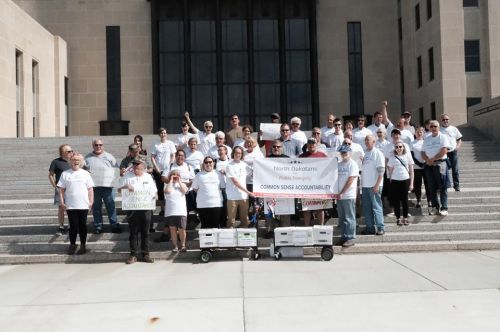News | February 15th, 2019

BISMARCK – Two bills are fighting for ethical supremacy in the North Dakota State Legislature.
Senate Bill 2148, sponsored by Senator Tim Mathern, a Democrat from Fargo, received a ‘Do Pass’ from Special Ethics Committee on Monday. The bill, if passed, will establish the creation of an ethics commission in North Dakota, enforce regulations on naming sole contributors for political contributions over $200, impose fines on violations, and adopt rules passed by popular vote pertaining to Measure 1, or article XIV of the Constitution of North Dakota.
The competing bill, House Bill 1521, sponsored by Republican Representative Chet Pollert and Senator Rich Wardner, is expected to pass in the House of Representatives. Among other changes the bill takes out the word “solely” for being responsible to report political donations.
Since the North Dakota Legislature convened, drafts of both bills have had hearings in the two chambers of government.
One of the main issues of contention between the competing bills comes down to one word: “solely.” The issue stems from the definitions of reporting where campaign funds come from.
Mathern’s bill definition: “‘Ultimate and true source’ means the person who knowingly contributed over two hundred dollars, adjusted for inflation, to influence a statewide election or an election for the legislative assembly.”
Pollert’s proposed change to HB 1521 would add the word solely: “‘Ultimate and true source’ means the person who knowingly contributed over two hundred dollars, adjusted for inflation, solely to influence a statewide election or an election for the legislative assembly.”
The change is more than semantics, Ellen Chaffee, one of the founders of North Dakotans for Public Integrity, who helped head up the 2018 fight for Measure 1, now known as Article XIV. The Constitutional measure will become law after one of the bills pass both houses and is signed by Governor Doug Burgum.
“If the Senate passes 2148 on the floor, then it will go to the House and we will have some leverage to make the final outcome at least a little more sensible,” Chaffee said. “House Bill 1521 is wildly unconstitutional. Anyone who believes in Constitutional law, or thinks legislators should listen to the people, or thinks ego-driven lawsuits are a waste of taxpayer money should be outraged by their behavior, no matter what they think of Article XIV.”
Gregory Stites, an attorney who is working with those involved in writing SB 2148, said Pollert’s proposed changes is full of loopholes.
“Even a PAC donation where a person is told $1 of your donation goes to overhead and $999 goes to influence isn’t reportable because the person’s $1,000 contribution isn’t going ‘solely’ to influence,” Stites said in an email.
Pollert’s House Bill proposal also raised penalties for false reporting from $100 to $500, and wants to classify such infractions as class B misdemeanors.
“Clearly, SB 2148 is vastly superior to the House Bill,” Stites said.
Complainants, which are typically protected in other state ethics commissions or committees, is one of primary issues opponents of establishing an Ethics Commission have. They believe rampant complaints will lead to widespread public knowledge and defamation.
The proposed bill given the go ahead by the Special Ethics Committee states that a complainant must make a signed statement swearing to authenticity within five days and if the deadline is missed, the commission will not investigate the complaint.
Reckless complaints will also be classified as defamation, and the North Dakota Secretary of State’s office can impose a fine of $100 upon anyone who commits a violation, according to SB 2148.
All complaints are deemed confidential and will not be made public until after six months, when an investigator has finished an investigation and the Ethics Commission issues a written report of findings. The Ethics Commission also does not have the power to terminate the employment of a public official.
Mathern's bill will allow the future Ethics Commission to determine a monetary amount for gifts that do not need to be reported.
A person does not have to file a report with the North Dakota Secretary of State’s office if a gift is to or from a family member, if the gift is for informational material, advice, or education, reimbursement for travel or meals during a conference, or while advising, or a good or service that doesn’t raise ethical concerns under rules established by the Ethics Commission.
Mathern’s proposed bill will be heard in the state Senate this week.
“What we need,” Ellen Chaffee said, “is pressure on the Senators to pass SB 2148 this week. That’s crucial.”

February 16th 2026
January 27th 2026
January 27th 2026
January 26th 2026
January 24th 2026
_(1)_(1)_(1)_(1)_(1)__293px-wide.jpg)

__293px-wide.png)

_(1)__293px-wide.jpg)
_(1)_(1)_(1)_(1)_(1)__293px-wide.jpg)